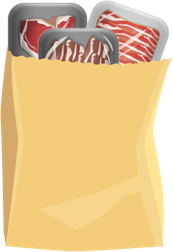If you’re a confirmed meat-eater, you are likely to relish the sizzle of a searing steak on the hob or bringing a perfectly crisp roast to the table from your Leisure range cooker. But, one thing that can make your meat dishes taste even better – apart from a homemade gravy – is the knowledge the ingredients come from a sustainable source.
These days we are becoming more aware of where our food comes from, and rightly so. We’re learning to look out for labels on pre-packaged meat and, where possible, to make the effort to buy from local farmers’ markets. Shopping for local, higher quality meat means we can ask about the farm the meat came from and find out about how the animals were raised.
As consumers, how can we make sure the meat we are buying is good quality and from a sustainable source?
Here, we speak to BigBarn about how the conscientious carnivore can look out for more sustainably reared meat.

© Bigbarn
Big Barn began as a social enterprise that helps consumers find local producers and growers to ensure they are getting good quality, fresh, local food and farmers receive a fair price for their produce.

By buying food directly from the producer you are immediately having a big effect on food sustainability and encouraging greater food production locally which will help boost the local economy.

© Bigbarn
Your local butcher will be able to tell you where and how the meat they are selling was raised. Ask them questions about the farm and its welfare standards, a good butcher should be proud of their product and will be happy to give you all the information you need.
It’s also becoming common for bigger supermarkets to have a dedicated butchery team who should be able to tell you the origin of the meat they sell, not only on the butcher’s counter but in the rest of the store. If you aren’t sure about a product in a supermarket, ask the in-store butcher or a member of staff.
It can also be a good idea to share any concerns you have with your local producers. This can influence them to produce or source meat in a more sustainable way – if there is consumer demand it’s in their interest.

In the UK, a good source of sustainable meat is goat. Goats’ milk and cheese is already popular, and goat is already popping up on the menus of some of the UK’s top restaurants. If you’re already a fan of feta this currently underrated meat could be one for you.
Wild game, such as deer, plays an important part in the ecosystem. But British deer don’t have any natural predators, meaning their numbers can soon grow to unmanageable numbers and damage the ecosystem. Carefully managed game keeping can be a sustainable way for consumers to continue eating meat.
Are there any labels to look out for when buying meat?
There are a number of labels consumers should be looking for if they are trying to buy sustainable meat, the top four are:

Rare Breed Survival Trust (RBST) logo: This means the meat comes from a native or rare breed of animal and is encouraging the continuation of these breeds.

Pasture for Life logo: Meat with this logo has been solely pasture-fed and is guaranteed to have been raised to the highest welfare standards.

RSPCA Assured logo (formerly Freedom Food): Shows the meat has been produced according to the RSPCA’s animal welfare standards.

Red Tractor logo: Food with this logo needs to meet the “Five Freedoms” requirements. These are:
- Freedom from hunger and thirst
- Freedom from discomfort
- Freedom from pain, injury, or disease
- Freedom to express normal behaviour
- Freedom from fear or distress
Looking for the logos mentioned above on the packaging is the easiest way to tell if meat from the supermarket has been raised sustainably and to a high standard of animal welfare. For certain meats, there are a few other things consumers can look for and, if in doubt, ask.



There are sustainable beef farms all over the UK, selling their meat direct or through local butchers and farm shops. All can be found on the BigBarn local food map.

By its nature, all lamb is free range, but many experts say that lamb is often killed too young and you get a far better flavour from an older lamb or young mutton.

Game is one of the most sustainable ways to eat meat as long as it’s locally sourced, wild meat.

29% of meat eaters in the UK said they have reduced their meat consumption in the last six months.

One in 5 report cutting back their meat consumption due to animal welfare concerns.

With all meat, look for quality over quantity. If you are looking to eat meat more sustainably, shop for locally produced meat occasionally. This means you’ll be helping to support farms with a higher standard of animal welfare.